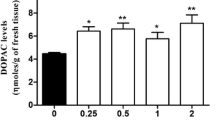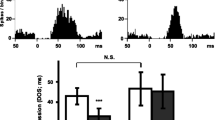Abstract
Acute (10 or 20 mg/kg IP) and subchronic (2 × 5 or 10 mg/kg IP daily for 7 days) effects of desipramine, imipramine, maprotiline, (+)- and (−)-oxaprotiline enantiomers as well as selective 5-HT-uptake inhibitors citalopram and ifoxetine on yawning, induced by low doses of apomorphine, were investigated in the rat. In addition, the effects of α-1 receptor agonist adrafinil and antagonist prazosin were also tested. After acute treatment, desipramine, the stereoselective NA-uptake inhibiting (+)-enantiomer of oxaprotiline, and the α-1 agonist adrafinil, markedly and significantly suppressed yawning. Prazosin, in contrast, clearly potentiated it. This potentiating effect was abolished by the pretreatment with (+)-oxaprotiline and adrafinil. Other drugs were inactive. After subchronic administration, yawning was antagonized by NA-uptake-inhibiting antidepressants, including imipramine and maprotiline. By comparison to the acute treatment, the inhibitory effects of desipramine and (+)-oxaprotiline were considerably enhanced. Neither selective 5-HT-uptake inhibitors nor (−)-oxaprotiline (levoprotiline) were active. Antidepressants therefore modulate the functional activity of D-2 receptors, activated by low doses of apomorphine, predominantly by the virtue of their noradrenergic enhancing properties. This modulatory effect appears to be mediated by α-1 adrenergic receptors.
Similar content being viewed by others
References
Delini-Stula A (1986) Progress in the psychopharmacology of antidepressants: selective uptake and MAO-inhibitors. Schweiz Arch Neur Psychiatr 137:121–133
Delini-Stula A, Mogilnicka E (1988) Single treatment with antidepressant oxaprotiline and its (+) and (−) enantiomers increase behavioural responses to dopaminergic stimulation in the rat. J Neurol Transm 71:91–98
Delini-Stula A, Vassout A, Hauser K, Bittiger H, Büch O, Olpe HR (1983) Oxaprotiline and its enantiomers: do they open new avenues in the research on the mode of action of antidepressants? In: Usdin E, Goldstein M, Friedhoff AJ, Georgotas A (eds) Frontiers in neuropsychiatry research. Macmillan, London, pp 121–134
Delini-Stula A, Radeke E, van Riezen H (1988) Enhanced functional responsiveness of the dopaminergic system — the mechanism of anti-immobility effects of antidepressants in the behavioural despair test in the rat. Neuropharmacology 27:943–947
Duteil J, Rambert FA, Pessonier J, Gombert R, Assous E (1979) A possible α-adrenergic mechanism for drug CRL 40 028-induced hyperactivity. Eur J Pharmacol 59:121–123
Holm AC, Ögren SO (1985) Differential effects of selective D2-receptor antagonists on the mediation of apomorphine-induced hypothermia and yawning. Acta Physiol Scand [Suppl 542] 124:226–231
Maj J, Wedzony K (1988) The influence of oxaprotiline enantiomers given repeatedly on the behavioural effects ofd-amphetamine and dopamine injected into the nucleus accumbens. Eur J Pharmacol 145:97–103
Menkes DB, Aghajanian G, Gallager D (1983) Chronic antidepressant treatment enhances agonist affinity of brain α1-adrenoceptors. Eur J Pharmacol 87:35–41
Mogilnicka E, Wedzony K, Klimek V, Czyrak A (1986) Desipramine induces yawning behaviour in rats. Neuropharmacology 25:783–786
Mogilnicka E, Zazula M, Wedzony K (1987) Functional supersensitivity to the α1-adrenoceptor agonist after repeated treatment with antidepressant drugs is not conditioned by β-downregulation. Neuropharmacology 26:1457–1461
Morelli M, Longoni R, Spina L, DiChiara G (1986) Antagonism of apormorphine-induced yawning by SCH 23390: evidence against the autoreceptor hypothesis. Psychopharmacology 89:259–260
Protais P, Dubuc I, Constentin J (1983) Pharmacological characteristics of dopamine receptors involved in the dual effect of dopamine agonists on yawning behaviour in rats. Eur J Pharmacol 94:271–280
Rambert FA, Pessonier J, de Sereville JE, Pointeau AM, Duteuil J (1986) Profil psychopharmacologique original d'adrafinil chez la Souris. J Pharmacol 17:37–52
Serra G, Argiolas A, Klimek V, Fadda F, Gessa GL (1979) Chronic treatment with antidepressants prevents the inhibitory effect of small doses of apormophine on dopamine synthesis and motor activity. Life Sci 25:415–424
Serra G, Argiolas A, Fadda F, Melis MR, Gessa GL (1981) Repeated electroconvulsive shock antagonizes apomorphine-induced EEG changes and sedation. Psychopharmacology 73:194–196
Serra G, Collu M, Gessa GL (1986) Dopamine receptors mediating yawning: are they autoreceptors? Eur J Pharmacol 120:187–192
Stahle L, Ungerstedt U (1984) Assessment of dopamine autoreceptor agonist properties of apomorphine, (+)-3-PPP and (−)-3-PPP by recording yawning behaviour in rats. Eur J Pharmacol 98:307–310
Stahle L, Ungerstedt U (1989) Yawning and suppression of exploration in amphetamine-treated rats, incompatibility with the autoreceptor hypothesis. Psychopharmacology 97:553–560
Waldmeier PC, Baumann PA, Hauser K, Maitre L, Storni A (1982) Oxaprotiline, a noradrenaline uptake inhibitor with an active and inactive enantiomer. Biochem Pharmacol 31:2169–2176
Waldmeier PC, Maitre L, Baumann PA, Hauser K, Bischoff S, Bittiger H, Paioni R (1986) Ifoxetine, a compound with atypical effects on serotonin uptake. Eur J Pharmacol 130:1–10
Weetman DF (1980) CRL-40 028. Drugs of the Future 5:433–435
Yamada K, Furukawa T (1980) Direct evidence of dopaminergic inhibition and cholinergic activation in yawning. Psychopharmacology 67:39–43
Author information
Authors and Affiliations
Rights and permissions
About this article
Cite this article
Delini-Stula, A., Hunn, C. Effects of single and repeated treatment with antidepressants on apomorphine-induced yawning in the rat: the implication of α-1 adrenergic mechanisms in thed-2 receptor function. Psychopharmacology 101, 62–66 (1990). https://doi.org/10.1007/BF02253719
Received:
Issue Date:
DOI: https://doi.org/10.1007/BF02253719




